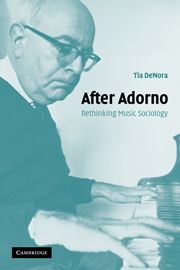Book contents
- Frontmatter
- Contents
- List of figures
- List of music examples
- Preface: a two part invention
- Acknowledgements
- A note on background reading
- 1 Adorno, ‘defended against his devotees’?
- 2 New methods and classic concerns
- 3 Music as cognition
- 4 How does music ‘channel’ emotion?
- 5 Music and ‘control’
- 6 After Adorno: rethinking music sociology
- Bibliography
- Index
1 - Adorno, ‘defended against his devotees’?
Published online by Cambridge University Press: 22 September 2009
- Frontmatter
- Contents
- List of figures
- List of music examples
- Preface: a two part invention
- Acknowledgements
- A note on background reading
- 1 Adorno, ‘defended against his devotees’?
- 2 New methods and classic concerns
- 3 Music as cognition
- 4 How does music ‘channel’ emotion?
- 5 Music and ‘control’
- 6 After Adorno: rethinking music sociology
- Bibliography
- Index
Summary
Introduction – music matters
Music has power, or so many people believe. Across culture and time it has been linked with persuasion, healing, corruption, and many other transformational matters. The idea behind these linkages is that music acts – on consciousness, the body, the emotions. Associated with this idea is another – the idea that music, because of what it can do, should be subject to regulation and control.
The history of music in the West is punctuated with attempts to enlist and censure music's powers. Most interesting of these centre on music's tonal properties as distinct from lyrics or libretti. The realm of sacred music offers many examples – Charlemagne's c.800ad ‘reform’ of chant, Pope Gregory XIII's call for ‘revising, purging, correcting and reforming’ church music (Hoppin 1978:50), the late sixteenth-century Protestant call for plain hymn singing (as opposed to elaborate polyphony), and, slightly later, J. S. Bach's dictum that the purpose of sacred music was ‘to organise the congregation’ are some of the better known. In the political realm, music has been mobilised or suppressed for its effects. Shostakovich's commission for a symphony to mark the anniversary of the Russian Revolution (and his later censure for writing ‘decadent’ music), the banishment of atonal music in Nazi Germany, and, in relatively recent times, the furore over national anthem renditions (the Sex Pistols' God Save the Queen or Jimi Hendrix's version of the Star Spangled Banner) all attest to the idea that music can instigate consensus and/or subversion.
- Type
- Chapter
- Information
- After AdornoRethinking Music Sociology, pp. 1 - 34Publisher: Cambridge University PressPrint publication year: 2003



